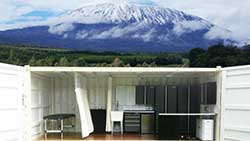When U.S. real estate investor Tom Petersen read about a great idea in a magazine to convert shipping containers into mobile medical clinics, he was inspired by its apparent simplicity and potential.Turning the idea into reality wasn’t so simple. One of the biggest challenges — and potential payoffs — in designing a “doc-in-a-box” clinic was creating access to telecommunications, according to a report in TopekaCapitalJournal.
The Navigators, an international Christian organization that does mission work, had put out the call years earlier asking whether anyone could go to Africa and build a clinic for a doctor who wanted to stay there and work.
Early attempts were overbuilt, oversized and overpriced, costing hundreds of thousands of dollars.
“So I pulled together some of the people I use in development,” Petersen said, and he began a long process of finding a solution for using shipping containers to make health care accessible to some of the poorest people in the world.
Laurie Garrett is credited with first proposing “doc-in-a-box” — a converted shipping container that provides basic medical care in remote areas, according to the TopekaCapitalJournal. Garrett is a Pulitzer Prize-winning journalist and a senior fellow on global health at NYC’s Council on Foreign Relations think tank.
Petersen made Garrett’s vision a reality by founding Primary Mobile Med International, which works to provide low-cost, quality health care to medically under-served and disaster-stricken areas.
His shipping-container clinic retails for $65,000, and includes basic medical capabilities including ultrasound, electrocardiograms and chemistry testing. Primary Mobile Med International is working to supply the clinics to countries, organizations and individuals worldwide.
“The big turning point for us was actually putting one in Ghana on the ground,” Petersen told TopekaCapitalJournal. “Within an hour, we had it set up and ready to function.”
Dr. Edith Clark owns the first Ghanaian clinic. She works with the Navigators charity to offer health care in Ghana. She linked her clinic to two other containers built locally to create a clinic in the port city of Tema, Ghana, offering occupational health and primary care services for dock workers, Petersen said.
The Ministry of Health in Ghana has ordered 20 more containers, and another order for 3,000 is in the works, according to Kevin Mapes, president of Primary Mobile Med International.
One of the biggest problems facing Primary Mobile Med International was finding a way to capture data electronically in parts of the world where health care isn’t tracked, Mapes said.
Patients seen at Primary Mobile Med International clinics have electronic medical records (EMR) and can be given a medical card that will record their treatment.
“The way that we’ve developed the data collection technology in these containers is utilizing the simple (electronic medical record) EMR solution that allows us the ability to transmit and send that data to whoever needs it,” Mapes said. “So, for example, if it’s a private physician who has that information, they can data warehouse that information with us, and from big data, we can extrapolate and normalize that data and we can pull information from that.”
Mobile phone technology in 98 percent of sub-Saharan Africa is on a 3G network, Mapes said.
“The biggest struggle was to figure out how to create a stable, reliable system to store the data in a place where you may not have a stable connection,” he said.
Getting data on health care in countries such as Ghana and Kenya is mind-boggling for Garrett, according to TopekaCapitalJournal. It means public health problems might be easily identified and outbreaks like Ebola could be shortened if data from a variety of medical clinics gave an early warning.
Source : http://afkinsider.com/

